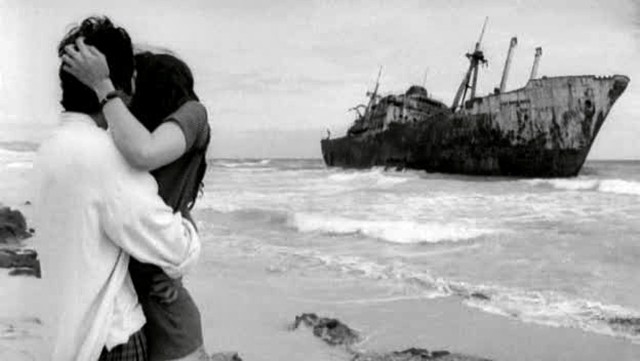
By Jae-Ha Kim
Chicago Sun-Times
March 13, 1998
![]()
Produced by Flavio R. Tambellini. Directed by Walter Salles and Daniela Thomas. Written by Thomas, Salles and Marcos Bernstein. Running time: 100 minutes.
Shot in black and white, “Foreign Land” is an evocative Portuguese film about a country in turmoil. It’s also a thrilling character study in which the striking stars display more sensual, onscreen chemistry than Leonardo DiCaprio and Kate Winslet in “Titanic.”
Opening today for a one-week run at Facets Multimedia, the 3-year-old film is subtitled in English. While some of the translations sound stilted (“Now I am not satisfied with a little. I want the whole of life”), the movie as a whole is breathtaking.
We are introduced early on to Paco, a 21-year-old acting student who lives with his seamstress mother in Brazil. Born in Spain, the mother dreams of returning home with her son. When the Brazilian government confiscates the country’s saving and checking accounts, she realizes that her life savings are not her own anymore.
She dies after hearing the news. A small piece of her son dies with her.
As Paco, Fernando Alves Pinto is a mesmerizing presence. Tall and slender, he conveys the character’s pathos in a vulnerable, uncertain way. Though technically a man, he in many ways is little more than a boy who has lost his mother’s protection.
Igor (Luis Melo) capitalizes on that. A jewelry smuggler masquerading as an antiques dealer, Igor finds Paco in a bar, mourning his mother’s death. He offers Paco a chance to visit his mother’s homeland. All he has to do is deliver a small package for him.
We’ve seen this plot in at least a couple dozen television cop shows. But what makes “Foreign Land” so compelling is the way the characters handle it. In Portugal, Paco becomes entangled with Alex (Fernanda Torres), a fiery 28-year-old waitress involved with a junkie boyfriend.
Aside from a gratuitious flash of female frontal nudity, directors Walter Salles and Daniela Thomas handle the love scenes in an intense, passionate way that generally implies more than it shows.
In “Foreign Land,” no one is 100 percent good or evil. Rather, they are flawed human beings making the most of their circumstances. As a result, neither the writers nor the audience has a need to rationalize any of their actions.